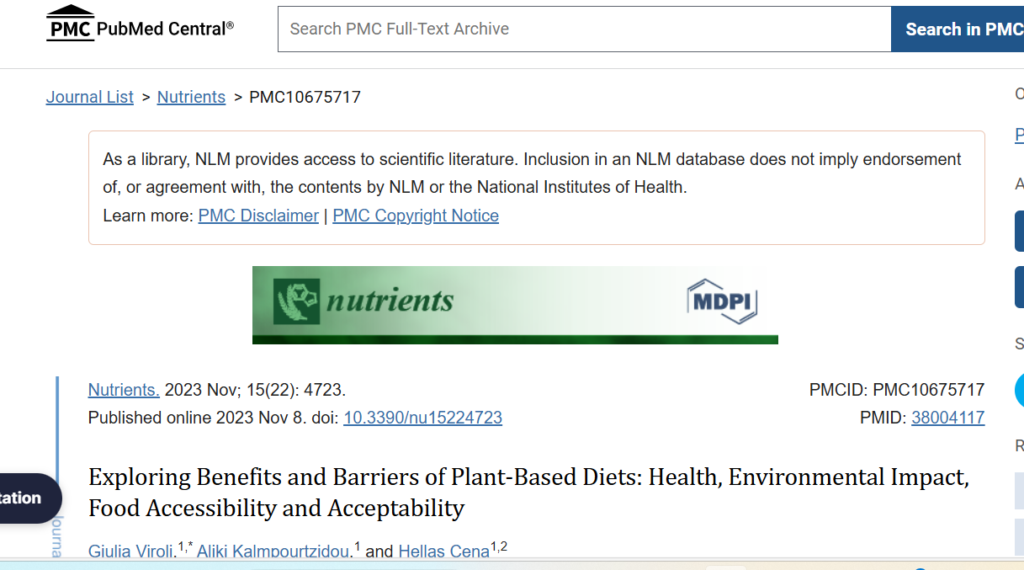How Can Plant-Based Eating Improve the Economy and Health?

Have you noticed the surge of plant-based options?
They have been in grocery stores and restaurants lately.
Veggie burgers “bleed.”
From veggie burgers that ‘bleed’ to many other plant-based alternatives, the options are no longer niche products but diverse choices.
The shift in consumer tastes towards plant-based diets is not just a trend but a reflection of a growing awareness of their benefits.
But the impact goes beyond personal health.
Choosing to eat more plants isn’t just a health-conscious decision; it’s a smart financial move that can save you money and contribute to the overall health of our economy.
This blog post will explore how eating plant-based meals can impact health. It will also cover their impact on the economy.
We’ll look at the research on the health benefits of a plant-based diet. It can lower chronic disease risks and improve gut health.
We’ll also explore the economic factors. They include possible cost savings and the growing plant-based food industry.
Are you a seasoned vegan or just curious about plant-based options?
This post will empower you with the information you need to make wise choices for your plate and wallet.
Health Benefits of Plant-Based Diets
Eating plant-based food is not just a trend; it’s a robust investment in your long-term health.
Here’s a breakdown of some key benefits you might experience:
Reduced Chronic Disease Risk
Plant-based diets contain fibre, vitamins, minerals, and antioxidants, crucial in preventing chronic illnesses.
Studies have shown a link between eating plants and a lower risk of heart disease. Eating these foods can also lower the risk of developing cancer and type 2 diabetes.
Weight Management
Plant-based meals are naturally lower in calories and fat than meat-based ones.
It also has lots of fibre.
Fibre keeps you full for longer, reduces cravings, and helps with weight management.
Improved Gut Health
Eating plant-based foods provides fibre as a prebiotic, nourishing the beneficial bacteria in your gut.
This process promotes a healthy gut microbiome.
A healthy microbiome is crucial for digestion, nutrient absorption, and immune function.
Overall Well-Being
Many people switch to a plant-based diet. They report higher energy, better mood, and improved digestion.
One reason is the abundance of critical nutrients. Also, meat-heavy diets lack processed foods and saturated fats.
Remember, these are just some of the potential health benefits.
A well-planned plant-based diet is crucial for reaping these rewards.
Later, we’ll discuss strategies. They ensure a balanced, healthy, plant-based approach.
Economic Benefits of Plant-Based Diets
The shift towards plant-based eating is good for your health, wallet, and the economy.

Here’s how:
Reduced Healthcare Costs
Chronic diseases, like heart disease and diabetes, strain healthcare systems. They place a significant burden on them.
Studies suggest that everyone could reduce these conditions by eating only plants.
This eating habit would lead to significant cost savings.
This approach translates to a healthier population and potentially lower healthcare costs for everyone.
Potential Grocery Bill Savings
Some plant-based alternatives can be pricier. But, essential plant-based foods like legumes, grains, and vegetables are cheaper than meat.
Cutting processed meats and dairy can also save on groceries. The amount depends on your diet.
Job Growth and Innovation
The plant-based food industry is booming. It creates new jobs in making, researching, and making.
This economic growth benefits communities. It also creates opportunities for innovation in plant-based food tech.
Environmental Considerations
Animal agriculture has a significant impact. It adds to greenhouse gas emissions and resource depletion.
Eating more plants can reduce this footprint. It can bring economic benefits by saving resources and supporting sustainability.
It’s important to acknowledge this.
The impact of plant-based diets on the economy can be complex.
The plant-based sector may bring cost savings and jobs. But, it may also cause job losses in animal agriculture.
However, the economic benefits and the positive environmental impact suggest that a slow shift to plant-based eating could help the economy.
Addressing Challenges and Concerns
Plant-based eating has significant benefits. But, there are also valid concerns and challenges to address:
Nutrient Deficiencies
A common concern is nutrient deficiencies. They often lack protein, iron, calcium, and vitamin B12.
However, a well-planned plant-based diet can do this. It should include whole grains, legumes, nuts, seeds, and fortified foods. They can ensure you get all the nutrients your body needs.
Guidance from a registered dietitian can help in developing a customized plan for your dietary needs.
Finding Balance
It’s not about eliminating all animal products overnight.
Adding more plant-based meals each week is a sustainable and fun approach. It brings many benefits.
Cost Concerns
Plant-based staples can be cheap. But, some processed plant-based alternatives can cost more than meat.
Focus on whole foods, cook at home, and use budget-friendly options.
The options include beans, lentils, and seasonal vegetables. They can help keep costs down.
Social Pressures
Social interactions often connect with eating habits.
Be prepared to navigate situations where food choices may differ.
Offer to bring a plant-based dish to potlucks.
Suggest restaurants with vegetarian options.
Or, politely explain your dietary choices.
There are also online communities and resources. They are for plant-based people to connect and share.
Remember, a plant-based journey is a personal one.
There’s no right or wrong way to do it.
Start small. Try new recipes. Focus on your health and the planet.
Recipe, Tips, and Resources
Recipe
Easy Lentil Soup with Lemon and Herbs (Serves 4)
This hearty and flavorful soup is a fantastic plant-based meal with protein and fibre.
It’s budget-friendly, easy to make, and perfect for a satisfying lunch or dinner.
Ingredients:
- 1 tbsp olive oil
- One onion, chopped
- Two carrots, chopped
- Two celery stalks, chopped
- Two cloves garlic, minced
- 1 cup brown lentils, rinsed
- 4 cups vegetable broth
- One can of diced tomatoes, undrained
- 1 tsp dried oregano
- 1/2 tsp dried thyme
- Salt and ground black pepper to taste
- 1/4 cup chopped fresh parsley (optional)
- 1/4 cup lemon juice
Instructions:
- Let olive oil heat in a large pot, preferably on medium heat. Toss celery, carrots, and onions and cook until softened about five minutes.
- After adding the garlic, cook for one more minute.
- Add lentils, vegetable broth, diced tomatoes, oregano, and thyme. Boil the mixture, lower the heat and let it simmer for twenty to twenty-five minutes until the lentils are soft.
- Season with salt and pepper to taste. Stir in chopped parsley (if using).
- Serve hot with fresh lemon juice and your favourite crusty bread.
Tips
- Feel free to add other vegetables to this soup, such as chopped zucchini, spinach, or kale.
- Blend some of the soup directly into the pot to achieve a creamier texture using an immersion blender.
- Use a sealed container to keep leftovers in the fridge for three days.
Resources
- Academy of Nutrition and Dietetics
- https://www.eatright.org/ – Provides credible information on plant-based nutrition.
- The Physicians Committee for Responsible Medicine
- https://www.pcrm.org/ – Offers resources on the health benefits of a plant-based diet.
- Forks Over Knives
- https://www.forksoverknives.com/
- A website promoting a plant-based lifestyle with recipes and educational resources.
Conclusion
Eating more plant-based meals is a win-win. It’s good for your health and wallet.
The benefits are clear. They include cutting the risk of chronic diseases and lowering grocery bills.
Plant-based eating has a multifaceted economic impact. It could create jobs in new industries and reduce healthcare costs.
We face challenges. We must eat a balanced diet and navigate social situations.
But today’s resources and support make a plant-based journey more accessible.
Remember, it’s not about perfection. Any step towards adding more plant-based options is positive.
So, why give it a try?
By planning and exploring, you might discover how tasty and rewarding a plant-based life can be.
We hope this blog post gave you the info you need. It can help you make informed diet choices.
Start small. Try new recipes. Embrace the good impact you can have on yourself and the planet.
After all, a healthy life equals a healthy future for all!
